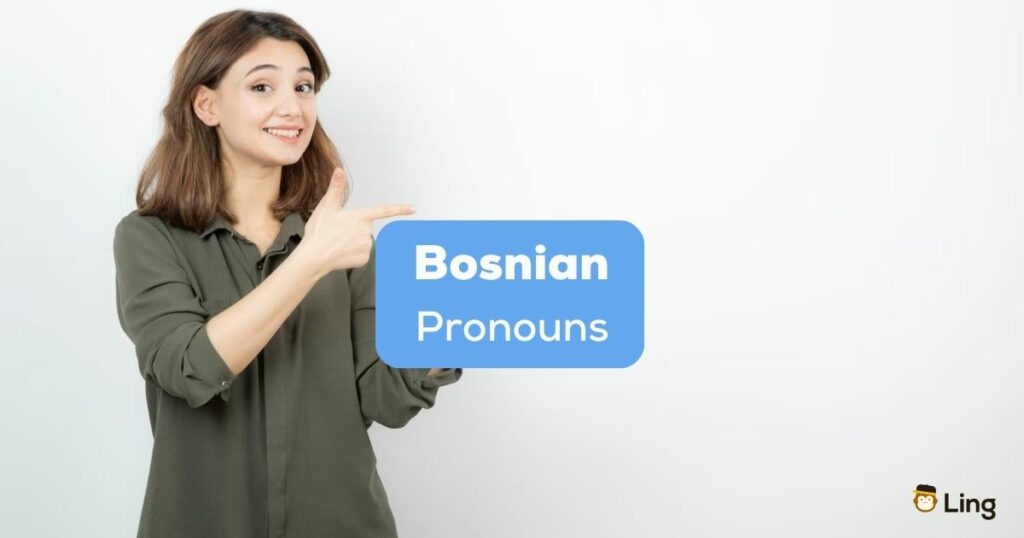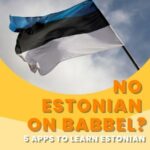Bosnian pronouns are more than just words. They’re your key to connecting with people in Bosnia. They shape conversations, define relationships, and even hint at local customs.
Are you curious about how to say “my” or “your” in the Bosnian language? Want to know the difference between formal and informal speech?
If so, join me as we learn the Bosnian pronouns together. From the basic “ja idem” (I go) to subject and object pronouns, we’ll explore each corner.
Don’t worry if you’re a beginner or brushing up; there’s a spot for you in this lesson. Ready to learn? Let’s get started.
The Personal Touch: Personal Pronouns
Bosnian personal pronouns are vital in distinguishing who is doing what. They divide into first, second, and third person, each with a unique role in a sentence. Understanding these will enable you to communicate more efficiently.
First Person: Understanding “I” And “We”
The first person pronouns, “ja” for “I” and “mi” for “we,” allow speakers to refer to themselves or a group they’re part of. It’s about inclusion, about being part of something or standing alone.
Example:
- “Ja čitam” – “I am reading.”
- “Mi čitamo” – “We are reading.”
Second Person: Formal And Informal “You”
In Bosnian, respect and context matter. “Ti” is used for informal “you,” while “vi” is used for a more formal address. This distinction helps in maintaining respectful communication.
Example:
- “Ti pjevaš” is informal, translating to “You sing.”
- “Vi pjevate” is the formal way to say, “You sing.”
Third Person: He, She, And They
Talking about someone else? Bosnians use “on” (he), “ona” (she), and “oni” (they). This grouping helps identify the gender and number of the people or objects being referred to.
Example:
- “On trči” – “He runs.”
- “One plešu” – “They dance,” referring to a group of females.

Claiming Ownership: Possessive Pronouns
Ownership in Bosnian grammar is described through a possessive pronoun (not to be confused with possessive adjectives). They help in determining who owns an object or objects. These pronouns vary in singular and plural forms, and understanding them is essential in expressing possession.
Singular Possessives: My, Your, His, Her
Singular possessive pronouns like “moj” (my) and “tvoj” (your) specify ownership of a single object. They connect directly to whom an object belongs, and understanding this connection is crucial to communication.
Example:
- “Moj auto” – “My car.”
- “Tvoja knjiga” – “Your book.”
Plural Possessives: Our, Your, Their
Plural possessive pronouns provide ownership information related to multiple subjects or objects. Words like “naš” (our) and “vaš” (your) define the relationship between the owners and what they own.
Example:
- “Naš dom” – “Our home.”
- “Vaša djeca” – “Your children.”
Shape-Shifters: Pronoun Declension
In the Bosnian language, pronoun declension means that pronouns change form based on their function in a sentence. It’s like putting on different clothes for different occasions. This adjustment helps the language to be more precise and flexible.
The Role Of Cases
Bosnian has different grammatical cases that shape the way pronouns are used. These cases tell us about the relationships between words in a sentence, guiding the understanding of a statement.
Example:
- Nominative: “Ja sam tu” – “I am here.”
- Accusative: “Vidim te” – “I see you.”
Changing Forms For Different Functions
The form of a pronoun changes depending on its function, whether it’s a subject, object, or shows possession. This variability adds complexity but also richness to the language.
Example:
- Genitive: “Njegovog psa” – “His dog.”
- Dative: “Daj mi” – “Give me.”
Being Specific: Demonstrative Pronouns
Demonstrative Bosnian pronouns help point to specific things. Like using a pointer in a presentation, they guide attention to “this” or “that.”
Navigating “This” And “That”
In Bosnian, “this” and “that” are conveyed by “ovaj” and “onaj.” These words help in identifying specific objects or subjects in a conversation.
Example:
- “Ovaj auto” – “This car.”
- “Onaj dom” – “That home.”
Usage In Sentences
Using demonstrative pronouns in sentences provides clarity and specificity. They highlight particular subjects or objects, giving direction to the conversation.
Example:
- “Ova knjiga je zanimljiva” – “This book is interesting.”
- “Onaj film je dosadan” – “That movie is boring.”

Questioning Minds: Interrogative Pronouns
Interrogative pronouns are the question words of Bosnian. They probe and inquire, seeking answers to “who,” “what,” and “which.”
Asking “Who” And “What”
“Ko” and “što” are used to ask “who” and “what,” respectively, in Bosnian. They’re essential in forming questions and seeking information.
Example:
- “Ko je to?” – “Who is that?”
- “Što je ovo?” – “What is this?”
Using “Which” For Choices
“Koji” is used for asking “which” in Bosnian, mainly when specific choices are involved. It adds a dimension of selection to the language.
Example:
- “Koji auto želiš?” – “Which car do you want?”
- “Koju knjigu čitaš?” – “Which book are you reading?”
The Unknowns: Indefinite Pronouns
Indefinite pronouns in Bosnian refer to nonspecific people or things. The primary pronouns are “neko” (someone), “nešto” (something), “svako” (everyone), and “iko” (anyone).
Generalizing With “Someone” And “Something”
In Bosnian, the concept of generalizing or referring to unspecified individuals and things is expressed through specific pronouns. “Neko” and “nešto” are central to this idea.
Example:
- “Neko mi je zvao” – “Someone called me.”
- “Nešto mi smeta” – “Something bothers me.”
Inclusive Language With “Everyone” And “Anyone”
In Bosnian, “svako” means “everyone” and is used for including all in a group. “Iko” means “anyone,” indicating no restrictions on who is referred to. These pronouns promote inclusivity and openness in communication.
Example:
- “Svako je dobrodošao” – “Everyone is welcome.”
- “Iko može doći” – “Anyone can come.”
The Reflective Mirror: Reflexive Pronouns And Verbs
In Bosnian, reflexive pronouns and verbs, such as “se,” create a special connection between the subject and the action, indicating that the subject is performing the action on itself. This concept adds depth to the language.
For example, in the sentence “Ja se češljam,” which means “I comb myself,” the reflexive pronoun “se” shows that the action of combing is directed at the subject pronoun “I.”
Similarly, “Ona se smeje” means “She laughs at herself,” again emphasizing that the action is self-directed. Understanding these reflexive pronouns and verbs enriches your ability to express complex thoughts in Bosnian.
Learn Bosnian Pronouns With Ling!
You’ve explored Bosnian pronouns. Now, it’s time to master them! With the Ling app, your learning doesn’t stop here. Whether you’re a beginner or an advanced learner, the Ling app caters to your needs in more than 60 languages.
With this app, you’ll get interactive lessons, engaging quizzes, and real-life language scenarios that excite you for the next lesson. It’s tailored to help you master the language, no matter where you are in your learning journey.
Are you eager to dive deeper? Get the Ling app from Google Play Store and App Store now. It’s your gateway to mastering a world of languages.



































































